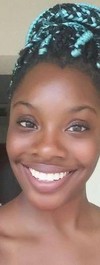But black women in the UK are used to the surreal experience of asking for advice on the best type of edge control from a Bangladeshi man. While official figures on the ethnic breakdown of black hair shop owners are not available, it is widely thought that almost all afro hair shops in the country are owned by South Asian men.XSandy's initially begun as a hair extension company in 2009, after a bout of illness saw Brown-Pinnock begin to lose her own hair. She was in need of a wig and disappointed by high street offerings, and so began to produce and sell her own product.One afternoon, a long time buyer challenged her about the dwindling quality of her hair, after a pack turned into an unusable tumble-weave post wash. "I asked her where she bought it. She told me the shop and I said, 'When you go back, I'll come with you.'"I was routinely followed around shops… by shop keepers who seem to think that the majority of the customer base are trying to steal their products.
Read more: Meet the Artist Using Superheroes to Highlight Racism
Sandra Brown-Pinnock opened XSandy's in 2009 as a hair extension company. Photo by Yomi Adegoke
"The shop assistant said, 'We don't, but here,'—he turned around and picked up another product—'use this'. I said, 'Why? What will it do to my hair? What's in it?' He didn't know. The mentality was as long as you've walked in, you shouldn't leave without spending."In the UK alone, black women spend six times more on hair products than white women, so it makes sense that people like Brown-Pinnock want to see black women benefit from the spoils of a billion-pound industry. But it goes beyond tribalism. Whilst the diversity of products, styles, and hair types is what makes black hair so great, it also raises lots of practical questions. The wrong answers waste time, money, and increasingly expensive packs of Xpressions extensions.Many of the existing male vendors simply don't know enough about black female hair because, well, they don't have it. And unlike e-cigs and electronics, there's no shorthand guide on how it all works."You walk in and it's all male," says Brown-Pinnock. "Why do we as black women ask a completely different race about our own hair when they don't have our hair type? Why would you ask them to explain to you what works for when your hair's breaking, or your skin's dry? But we do that."Read more: Revisiting Michele Wallace's Essential Black Feminist Text 'Black Macho'
Mudahy's response to the idea that only black women can cater to black women is straightforward.What are we leaving for the next generation? Our legacy? It's about ownership for black people.
A display stand in XSandy's. Photo by Yomi Adegoke
Despite stocking the same products at the same prices as the high street, she believes her store has another USP other than expertise: It keeps money "coming back into the community.""It's about employment," she says. "I employ all black. I don't care what anyone says."Asian owned shops also primarily employ other Asian people, but for a different reason: The soaring cost of London rent and gentrification plague both Brown-Pinnock and her rivals. When it comes to one of the biggest criticisms—the lack of black staff—Mudahy offers an explanation. "They're struggling to pay the bills, so they've got family members working in there. It's a struggle for them too."Brown-Pinnock is opening another London store in Peckham this month. She has plans for stores in Dalston and Finsbury Park, too. But she wants—more than the success of her own store—company. She's a minority in the one industry she logically shouldn't be. Like most of us, she's simply looking forward to the day a black woman opening a black hair store is as underwhelming as it was in the 80s."What are we leaving for the next generation?" she asks. "Our legacy? It's about ownership for black people."Read more: The Strange, Sensitive World of Plastic Surgery Photography
